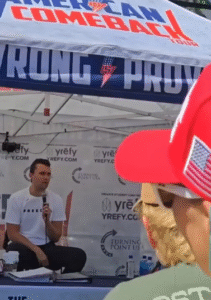The shooting of Charlie Kirk, a prominent right-wing activist and founder of Turning Point USA, has sent shockwaves through political circles and social media alike. On September 10, 2025, during a live event at Utah Valley University as part of his “American Comeback Tour,” Kirk was fatally shot in the neck while speaking to a crowd gathered under a white tent emblazoned with slogans like “Prove Me Wrong” and “The American Comeback”.
🎯 The Moment of Impact Graphic video footage captured the horrifying moment: Kirk seated, speaking into a microphone, when a single gunshot rang out. His head snapped backward, and he collapsed from his chair as blood began to pour from his neck. Panic erupted instantly—audience members screamed and fled, while security rushed to his aid. The footage, now widely circulated across platforms like X, TikTok, and YouTube, has sparked intense debate about the ethics of sharing violent content online.
🕊️ Immediate Aftermath Kirk was quickly transported to a nearby hospital, but he succumbed to his injuries later that afternoon. The university confirmed that a suspect was in custody, and the FBI announced it was actively investigating the incident. President Donald Trump posted a tribute on Truth Social, calling Kirk “The Great, and even Legendary,” and praising his connection to America’s youth. Other political figures, including Vice President JD Vance and Secretary of Defense Pete Hegseth, offered prayers and condolences.
📱 The Role of Social Media The viral spread of the shooting video has reignited conversations about the role of social media in modern news dissemination. Traditional media outlets blurred or omitted the most graphic parts, but millions viewed unfiltered clips online within minutes. Some users pleaded for restraint, urging others not to share the footage out of respect for Kirk’s family. Others argued that the video was a necessary record of a public tragedy.
🧠 Charlie Kirk’s Legacy Kirk, 31, was a polarizing figure in American politics. He co-founded Turning Point USA at age 18 and became known for his confrontational style, campus debates, and outspoken conservative views. He was a close ally of President Trump and frequently criticized progressive movements, including Black Lives Matter and critical race theory. His rhetoric often drew sharp rebuke from civil rights organizations, especially after controversial statements about Martin Luther King Jr. and the Civil Rights Act.
Despite the controversy, Kirk had a loyal following and was considered a rising star in conservative circles. His death has been described by supporters as an attack on free speech and democracy. Critics, while acknowledging the tragedy, have wrestled with the complexity of mourning a figure whose views they found deeply divisive.
🧩 Unanswered Questions As of now, many details remain unclear. The identity and motive of the shooter have not been publicly confirmed. Was this politically motivated? Was Kirk targeted for his views, or was it a random act of violence? Investigators are working to piece together the timeline and context, while the public grapples with the emotional and political fallout.
⚖️ Ethics of Visibility This incident also raises broader questions about visibility, violence, and the ethics of digital witnessing. Should graphic content be shared freely in the name of transparency, or should it be filtered to protect dignity and privacy? The Kirk shooting has become a case study in how quickly tragedy can be commodified, dissected, and debated in the digital age.
🧵 A Nation Reflects In the wake of Kirk’s death, America finds itself at a crossroads. The incident is not just a political flashpoint—it’s a cultural mirror. It reflects the volatility of public discourse, the fragility of safety even in seemingly controlled environments, and the power of media to shape collective memory.
Whether one admired Kirk or opposed him, his death is a moment that demands reflection. It’s a reminder of the human cost of ideological warfare, and the urgent need for dialogue that doesn’t end in violence.
If you’d like, I can help you craft a tribute, a statement, or even a visual piece that honors the complexity of this moment.


